初中英语形容词副词的比较级最高级大全(2)(最新整理)
初中英语语法形容词和副词的比较级和最高级2(自动保存的)

形容词和副词的比较级和最高级一.形容词和副词的比较级和最高级的变化方法如下(1) 符合规则的:例题解析1. He is ________ friends than I.A. much moreB. many moreC. very moreD. too more解析:后面有可数名词复数时,many的比较级形式为many more 修饰。
应选B.2. Which is the _________ country, Japan or Australia?A. more developedB. more developingC. most developedD. most developing解析:两者比较用比较级,表示"发达"用developed, 而developing 是"发展中的"3. There were _______ shops in the city in 1982 than in 1990.A. littleB. fewC. fewerD. less解析:little 不能修饰可数名词,两者比较需用比较级,所以应选C.4. If you are not free today, come another day __________.A. tooB. soC. insteadD. yet解析:instead 作副词用时意为"代替,顶替",表示前面的事情没做,而是做了后面的事。
Instead一般位于句首。
应选C.5.He can't tell us ________, I think.A. important anythingB. anything importantC. important somethingD. something important.解析:不定代词与形容词联用需后置,否定句中应该用anything而不是something. 因此应选B6. The Huang River is the second __________ river in our country.A. longB. longerC. longestD. the longest解析:"定冠词the+ 序数词+ 形容词最高级" 表示"第几大……" 应选C.7. The light in the office wasn't ________for him to read.A. enough brightB. bright enoughC. brightlyD. enough brightly解析:enough修饰名词时可前可后,修饰形容词或副词时,要后置。
初中英语形容词和副词的比较级和最高级大全(各版本通用)

creative
serious
simplest
ablest
handsomest
lamest
politest
cutest
3、双写+er,est
原级
比较级
最高级
原级
比较级
最高级
原级
比较级
最高级
red
big
hot
redder
bigger
hotter
reddest
biggest
hottest
thin
fat
sad
thinner
fatter
meaner
wilder
duller
cleverer
narrower
yellower
fewest
freshest
grayest
calmest
sourest
blindest
dumbest
baldest
deafest
meanest
wildestdullestFra bibliotekcleverest
narrowest
yellowest
unfriendly
easy
happy
healthy
busy
funny
scary
earlier
uglier
curlier
lovelier
livelier
friendlier
unfriendlier
easier
happier
healthier
busier
funnier
scarier
earliest
初中英语形容词副词的比较级最高级大全

1、一 般单音节词和“er, ow, y, le”结尾的双音节词+er, est。
hard quick cold newsourround smart loud mean stupid wild dull quiet black warm sick bright cool near weak bald young straight tall short long calm deep cheap strong high slow dark great blind dumb deaf full poor realfew grayoften(2) stupid(2)polite(2种)clever narrowsimple
2、e结尾的+r, st
fine free close nice able white blonde sore true large safe handsome lame true sure cute(2种)
3、单元音+1个辅音双写词尾+er, est
red big hot thin fat sad slim flat mad
simple
fine
true
cute
red
hot
fat
slim
mad
easy
happy
healthy
amazing
awful
exciting
excited
lazy
unhappy
unlucky
tiny
heavy
lively
原形 比较级 最高级
carefully
beautifully
active
初中英语形容词和副词的比较级和最高级大全(各版本通用)
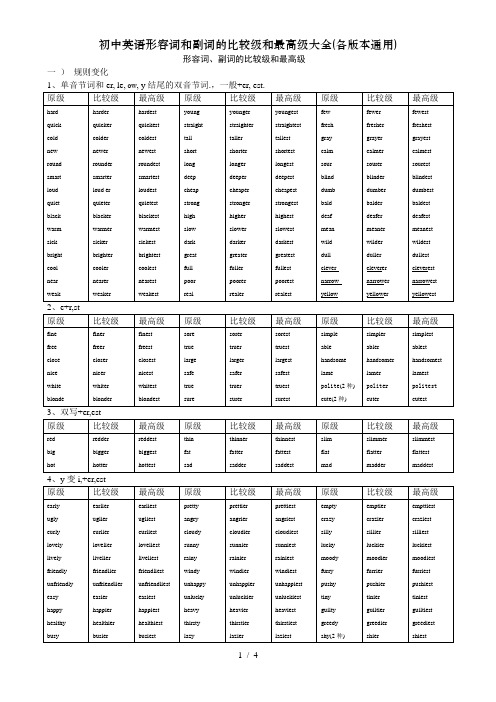
furrier
pushier
tinier
guiltier
greedier
shier
empttiest
craziest
silliest
luckiest
moodiest
furriest
pushiest
tiniest
guiltiest
greediest
shiest
5、多音节词和部分双音节词,还有ly结尾的副词,在词前+more, most。(斜体词不考)
unfriendly
easy
happy
healthy
busy
funny
scary
earlier
ugllivelier
friendlier
unfriendlier
easier
happier
healthier
busier
funnier
scarier
earliest
ugliest
warmest
sickest
brightest
coolest
nearest
weakest
young
straight
tall
short
long
deep
cheap
strong
high
slow
dark
great
full
poor
real
younger
straighter
taller
shorter
longer
quicker
colder
newer
rounder
smarter
louder
形容词和副词的比较级和最高级(完美版)
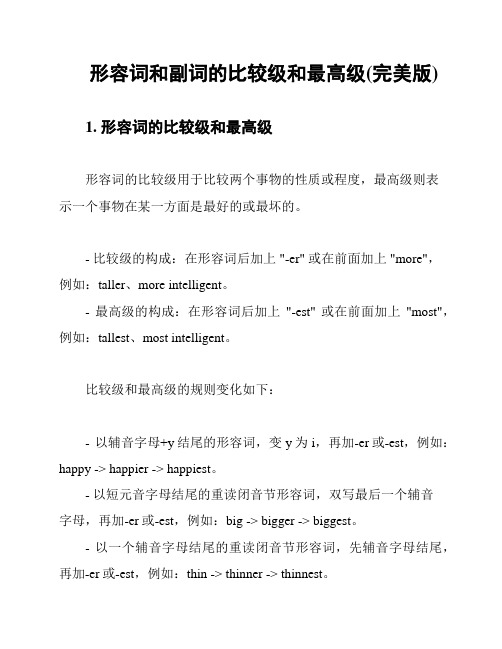
形容词和副词的比较级和最高级(完美版)1. 形容词的比较级和最高级形容词的比较级用于比较两个事物的性质或程度,最高级则表示一个事物在某一方面是最好的或最坏的。
- 比较级的构成:在形容词后加上 "-er" 或在前面加上 "more",例如:taller、more intelligent。
- 最高级的构成:在形容词后加上"-est" 或在前面加上"most",例如:tallest、most intelligent。
比较级和最高级的规则变化如下:- 以辅音字母+y结尾的形容词,变y为i,再加-er或-est,例如:happy -> happier -> happiest。
- 以短元音字母结尾的重读闭音节形容词,双写最后一个辅音字母,再加-er或-est,例如:big -> bigger -> biggest。
- 以一个辅音字母结尾的重读闭音节形容词,先辅音字母结尾,再加-er或-est,例如:thin -> thinner -> thinnest。
- 多音节和部分双音节形容词前加more或most,例如:beautiful -> more beautiful -> most beautiful。
2. 副词的比较级和最高级副词的比较级和最高级的构成方式与形容词类似,只是在形容词的基础上加上 "-ly" 构成副词。
- 比较级的构成:在副词后加上 "-er" 或在前面加上 "more",例如:faster、more quickly。
- 最高级的构成:在副词后加上 "-est" 或在前面加上 "most",例如:fastest、most quickly。
与形容词类似,副词的规则变化也遵循相同的规律。
初中英语形容词和副词的比较级和最高级大全(各版本通用)
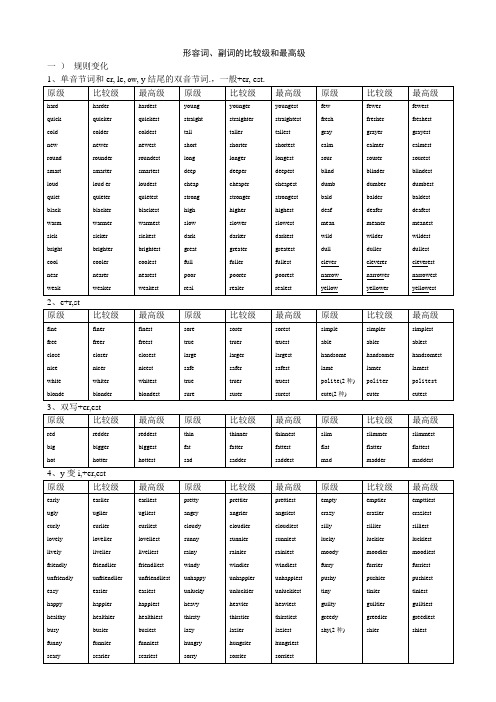
loveliest
liveliest
friendliest
unfriendliest
easiest
happiest
healthiest
busiest
funniest
scariest
pretty
angry
cloudy
sunny
rainy
windy
unhappy
unlucky
heavy
thirsty
quicker
colder
newer
rounder
smarter
louder
quieter
blacker
warmer
sicker
brighter
cooler
nearer
weaker
hardest
quickest
coldest
newest
roundest
smartest
loudest
quietest
blackest
beautiful
creative
serious
moodier
furrier
pushier
tinier
guiltier
greedier
shier
empttiest
craziest
silliest
luckiest
moodiest
furriest
pushiest
tiniest
guiltiest
greediest
shiest
5、多音节词和部分双音节词,还有ly结尾的副词,在词前+more, most。(斜体词不考)
初中英语知识点归纳形容词和副词的比较级和最高级
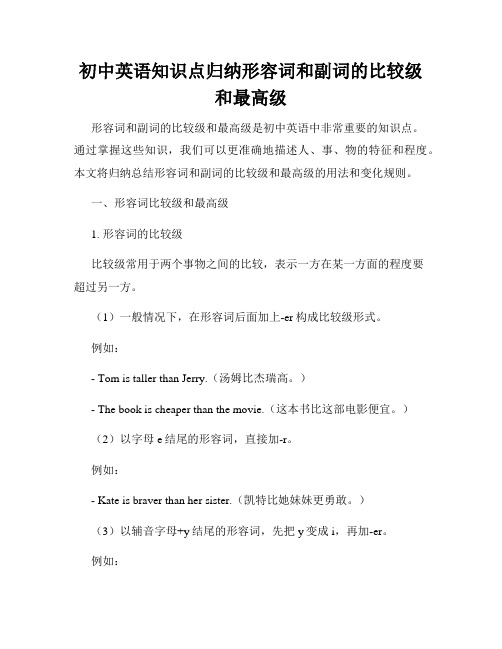
初中英语知识点归纳形容词和副词的比较级和最高级形容词和副词的比较级和最高级是初中英语中非常重要的知识点。
通过掌握这些知识,我们可以更准确地描述人、事、物的特征和程度。
本文将归纳总结形容词和副词的比较级和最高级的用法和变化规则。
一、形容词比较级和最高级1. 形容词的比较级比较级常用于两个事物之间的比较,表示一方在某一方面的程度要超过另一方。
(1)一般情况下,在形容词后面加上-er构成比较级形式。
例如:- Tom is taller than Jerry.(汤姆比杰瑞高。
)- The book is cheaper than the movie.(这本书比这部电影便宜。
)(2)以字母e结尾的形容词,直接加-r。
例如:- Kate is braver than her sister.(凯特比她妹妹更勇敢。
)(3)以辅音字母+y结尾的形容词,先把y变成i,再加-er。
例如:- This shirt is prettier than that one.(这件衬衫比那件更漂亮。
)(4)部分双音节和多音节形容词在前面加上more来构成比较级形式。
例如:- He is more intelligent than his classmates.(他比他的同学们更聪明。
)2. 形容词的最高级最高级用于三个或三个以上的事物之间的比较,表示一方在某一方面的程度是所有事物中最高的。
(1)在形容词后面加上-est构成最高级形式。
例如:- Alice is the tallest girl in the class.(艾丽斯是班上最高的女孩。
)- This is the cheapest phone I've ever seen.(这是我见过的最便宜的手机。
)(2)以字母e结尾的形容词,直接加-st。
例如:- It is the largest lake in the city.(这是城市里最大的湖。
)(3)以辅音字母+y结尾的形容词,先把y变成i,再加-est。
初中形容词和副词的比较级最高级

初中形容词和副词的比较级最高级形容词和副词的比较级和最高级变化方法如下:1) 符合规则的:一般情况:直接加-er和-est。
以e结尾的词:直接加-r和-st。
以“辅音+y”结尾的词:变y为i再加-er和-est。
以一个辅音字母结尾的词:辅音字母双写,再加-er和-est。
例词:all-taller-tallest。
nice-nicer-nicest。
dry-drier-driest。
heavy-heavier-heaviest。
XXX-XXX-thinnest。
多音节和部分双音节单词在词前加more和most,如more us。
2) 几个不规则的形容词和副词的比较级和最高级如下表:原级:good。
well。
bad。
ill。
many。
much。
little。
far比较级:better。
worse。
more。
less。
XXX最高级:XXX。
worst。
most。
least。
XXX形容词和副词比较级的用法:级别表达方式和意义例句原级 As+原级+as(像……一样) XXX。
不如……那样) She does not study so well as I do。
比较级比较级+than(比……) XXX XXX。
比较级前面可以加much。
far。
even。
still。
a lot。
a little。
a bit等。
I like pork better than beef。
程度加深比较级+and+比较级(越来越……) XXX。
The +比较级,the +比较级(越……,越……) XXX.The more books she reads。
the better her XXX the best season of the year。
Lin Tao jumped the farthest of all。
Note that the article "the" is often omitted before the XXX。
初中英语语法形容词和副词的比较级和最高级简单记法
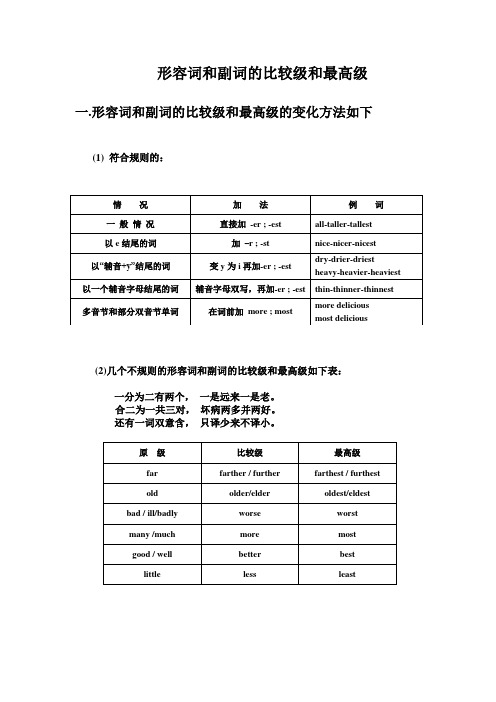
形容词和副词的比较级和最高级一.形容词和副词的比较级和最高级的变化方法如下(1) 符合规则的:(2)几个不规则的形容词和副词的比较级和最高级如下表:一分为二有两个,一是远来一是老。
合二为一共三对,坏病两多并两好。
还有一词双意含,只译少来不译小。
二.形容词和副词比较级的用法注意:有些形容词,如dead, empty, round, sure, woolen等受本身含义的限制,没有比较级。
例题解析1. He is ________ friends than I.A. much moreB. many moreC. very moreD. too more解析:后面有可数名词复数时,many的比较级形式为many more 修饰。
应选B.2. Which is the _________ country, Japan or Australia?A. more developedB. more developingC. most developedD. most developing解析:两者比较用比较级,表示"发达"用developed, 而developing 是"发展中的" 意思3. There were _______ shops in the city in 1982 than in 1990.A. littleB. fewC. fewerD. less解析:little 不能修饰可数名词,两者比较需用比较级,所以应选C.4. If you are not free today, come another day __________.A. tooB. soC. insteadD. yet解析:instead 作副词用时意为"代替,顶替",表示前面的事情没做,而是做了后面的事。
Instead一般位于句首。
应选C.5.He can't tell us ________, I think.A. important anythingB. anything importantC. important somethingD. something important.解析:不定代词与形容词联用需后置,否定句中应该用anything而不是something. 因此应选B6. The Huang River is the second __________ river in our country.A. longB. longerC. longestD. the longest解析:"定冠词the+ 序数词+ 形容词最高级" 表示"第几大……" 应选C.7. The light in the office wasn't ________for him to read.A. enough brightB. bright enoughC. brightlyD. enough brightly解析:enough修饰名词时可前可后,修饰形容词或副词时,要后置。
初中英语形容词副词的比较级最高级大全
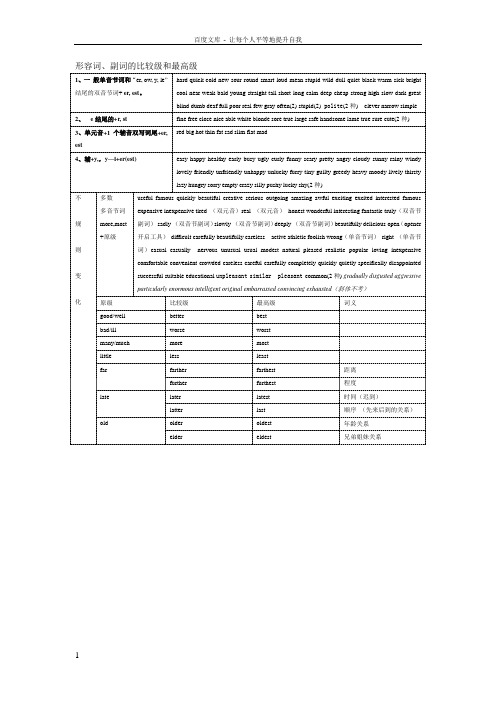
interested
famous
expensive
inexpensive
tired
delicious
open
difficult
dark
early
busy
ugly
curly
funny
scary
pretty
angry
cloudy
sunny
lovely
empty
hungry
原形比较级最高级
原级
比较级
最高级词义ຫໍສະໝຸດ good/wellbetter
best
bad/ill
worse
worst
many/much
more
most
little
less
least
far
farther
farthest
距离
further
furthest
程度
late
later
latest
时间(迟到)
latter
last
顺序(先来后到的关系)
形容词、副词的比较级和最高级
1、一般单音节词和“er, ow, y, le”结尾的双音节词+er, est。
hard quick cold newsourround smart loud mean stupid wild dull quiet black warm sick bright cool near weak bald young straight tall short long calm deep cheap strong high slow dark great blind dumb deaf full poor realfew grayoften(2) stupid(2)polite(2种)clever narrowsimple
初中英语语法形容词和副词的比较级和最高级简单记法

形容词和副词的比较级和最高级一.形容词和副词的比较级和最高级的变化方法如下(1) 符合规则的: (2)几个不规则的形容词和副词的比较级和最高级如下表: 一分为二有两个, 一是远来一是老。
合二为一共三对, 坏病两多并两好。
还有一词双意含, 只译少来不译小。
二.形容词和副词比较级的用法注意:有些形容词,如dead, empty, round, sure, woolen等受本身含义的限制,没有比较级。
例题解析1. He is ________ friends than I.A. much moreB. many moreC. very moreD. too more解析:后面有可数名词复数时,many的比较级形式为many more 修饰。
应选B.2. Which is the _________ country, Japan or Australia?A. more developedB. more developingC. most developedD. most developing解析:两者比较用比较级,表示"发达"用developed, 而developing 是"发展中的" 意思3. There were _______ shops in the city in 1982 than in 1990.A. littleB. fewC. fewerD. less解析:little 不能修饰可数名词,两者比较需用比较级,所以应选C.4. If you are not free today, come another day __________.A. tooB. soC. insteadD. yet解析:instead 作副词用时意为"代替,顶替",表示前面的事情没做,而是做了后面的事。
Instead一般位于句首。
应选C.5.He can't tell us ________, I think.A. important anythingB. anything importantC. important somethingD. something important.解析:不定代词与形容词联用需后置,否定句中应该用anything而不是something. 因此应选B6. The Huang River is the second __________ river in our country.A. longB. longerC. longestD. the longest解析:"定冠词the+ 序数词+ 形容词最高级" 表示"第几大……" 应选C.7. The light in the office wasn't ________for him to read.A. enough brightB. bright enoughC. brightlyD. enough brightly解析:enough修饰名词时可前可后,修饰形容词或副词时,要后置。
初中英语知识归纳形容词和副词的比较级和最高级构成

初中英语知识归纳形容词和副词的比较级和最高级构成形容词和副词是英语中常见的词性,用来修饰名词或者动词等。
比较级和最高级是形容词和副词构成的两种特殊形式,在句子中用来表达两个或多个事物之间的比较关系。
本文将对初中英语知识中的形容词和副词的比较级和最高级进行归纳和总结。
一、形容词的比较级和最高级构成方式1. 一般情况下,在形容词的原级后面加上"-er"构成比较级,加上"-est"构成最高级。
例如:原级:tall(高的)比较级:taller(更高的)最高级:tallest(最高的)2. 以"e"结尾的形容词,在原级后面只需加上"-r"和"-st"。
例如:原级:large(大的)比较级:larger(更大的)最高级:largest(最大的)3. 以辅音字母+y结尾的形容词,把"y"变为"i",再加上"-er"和"-est"。
例如:原级:happy(快乐的)比较级:happier(更快乐的)最高级:happiest(最快乐的)4. 以重读闭音节结尾,并且末尾只有一个辅音字母的形容词,要双写这个辅音字母,再加上"-er"和"-est"。
例如:原级:big(大的)比较级:bigger(更大的)最高级:biggest(最大的)5. 部分形容词的比较级和最高级是不规则的,需要特殊记忆。
例如:原级:good(好的)比较级:better(更好的)最高级:best(最好的)二、副词的比较级和最高级构成方式1. 大多数副词的比较级和最高级构成方式与形容词相同,在副词的原级后面加上"-er"和"-est"。
例如:原级:quickly(快速地)比较级:more quickly(更快地)最高级:most quickly(最快地)2. 以"e"结尾的副词,在原级后面只需加上"-r"和"-st"。
初中英语形容词和副词的比较级和最高级大全(各版本通用)

colder
newer
rounder
smarter
louder
quieter
blacker
warmer
sicker
brighter
cooler
nearer
weaker
hardest
quickest
coldest
newest
roundest
smartest
loudest
quietest
blackest
stupid(2种)
mostgradually
mostdisgusted
mostaggressive
deeper
cheaper
stronger
higher
slower
darker
greater
fuller
poorer
realer
youngest
straightest
tallest
shortest
longest
deepest
cheapest
strongest
highest
slowest
darkest
原级
比较级
最高级
原级
比较级
最高级
open
wrong
right
tired
clearly
loudly
quietly
truly
sadly
slowly
deeply
carefully
completely
quickly
quietly
carefully
beautifully
comfortably
(完整版)初中英语形容词副词的比较级最高级大全

形容词、副词的比较级和最高级1、一般单音节词和“er, ow, y, le”结尾的双音节词+ er, est。
hard quick cold new sour round smart loud mean stupid wild dull quiet black warm sick bright cool near weak bald young straight tall short long calm deep cheap strong high slow dark great blind dumb deaf full poor real few gray often(2) stupid(2) polite(2 种) clever narrow simple2、e 结尾的+r, st fine free close nice able white blonde sore true large safe handsome lame true sure cute(2 种)3、单元音+1 个辅音双写词尾+er,estred big hot thin fat sad slim flat mad4、辅+y,,y—i+er(est) easy happy healthy early busy ugly curly funny scary pretty angry cloudy sunny rainy windylovely friendly unfriendly unhappy unlucky furry tiny guilty greedy heavy moody lively thirstylazy hungry sorry empty crazy silly pushy lucky shy(2 种)不规则变化多数多音节词more,most+原级useful famous quickly beautiful creative serious outgoing amazing awful exciting excited interested famousexpensive inexpensive tired (双元音)real (双元音)honest wonderful interesting fantastic truly(双音节副词)sadly (双音节副词)slowly (双音节副词)deeply (双音节副词)beautifully delicious open(opener 开启工具)difficult carefully beautifully careless active athletic foolish wrong(单音节词)right (单音节词)casual casually nervous unusual usual modest natural pleased realistic popular lovinginexpensive comfortable convenient crowded careless careful carefully completely quickly quietly specificallydisappointed successful suitable educational unpleasant similar pleasant common(2 种) graduallydisgusted aggressive particularly enormous intelligent original embarrassed convincing exhausted(斜体不考)原级比较级最高级词义good/well better bestbad/ill worse worstmany/much more mostlittle less leastfar farther farthest 距离further furthest 程度late later latest 时间(迟到)latter last 顺序(先来后到的关系)old older oldest 年龄关系elder eldest 兄弟姐妹关系形容词、副词的比较级和最高级的考试原形hard 比较级最高级原形carefully比较级最高级原形stupidwildmuchlittlefarlateoldsuccessfulunpleasantsimilarpleasantpolitecommongoodwellbadillmanyquietdeaffullpoorrealgrayoftenclevernarrowsimplefinetruecuteredhotfatslimmadeasyhappyhealthyamazing比较级最高级quick beautifully cold active nervous wrong unusual right usual round modest smart natural loud realistic short popular long loving calm inexpensive cheap comfortable strong convenient high crowded realnew honest sour wonderful warm interesting sick sadly bright slowly cool deeply near beautifully free interested close famous nice expensive able inexpensive white tiredsore delicious true openlarge difficult handsome dark careless early careful busy carefully ugly quickly curly quietly funny disappointed scary friendly pretty unfriendly angry unhappy cloudyunlucky sunny awful tiny lovely exciting heavy empty excited lively hungry lazy。
初中英语形容词和副词的比较级和最高级大全各版本通用
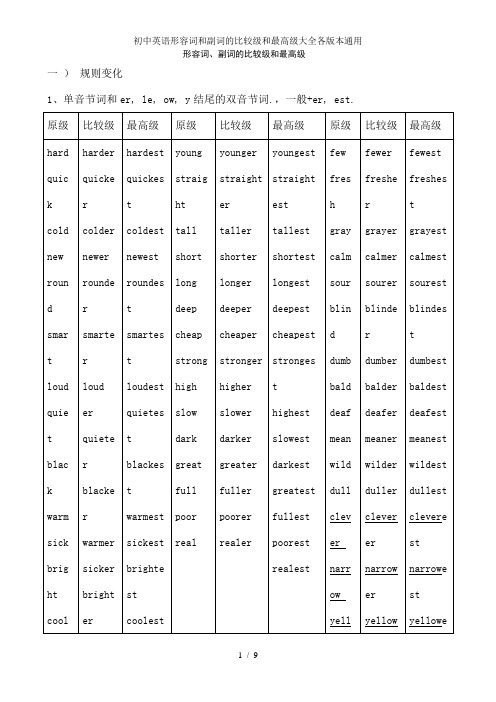
exhausted
moreactive
moreathletic
morefoolish
more different
morenecessary
morenervous
moreusual
moreunusual
more popular
more loving
more boring
more inexpensive
more completely
more quickly
more quietly
morecarefully
morebeautifully
more comfortably
moreuseful
morefamous
morebeautiful
morecreative
moreserious
moreoutgoing
mostnervous
mostusual
mostunusual
mostpopular
mostloving
mostboring
mostinexpensive
mostcomfortable
mostcareless
mostcareful
mostsuccessful
mostpleasant
mostunpleasant
curliest
loveliest
liveliest
friendliest
unfriendliest
easiest
happiest
healthiest
busiest
funniest
scariest
pretty
angry
cloudy
初中英语形容词副词的比较级最高级大全

形容词、副词的比较级和最高级1、一般单音节词和“er, ow, y, le”结尾的双音节词+ er, est。
hard quick cold new sour round smart loud mean stupid wild dull quiet black warm sick bright cool near weak bald young straight tall short long calm deep cheap strong high slow dark great blind dumb deaf full poor real few gray often(2) stupid(2) polite(2种) clever narrow simple2、e结尾的+r, st fine free close nice able white blonde sore true large safe handsome lame true sure cute(2种)3、单元音+1个辅音双写词尾+er,estred big hot thin fat sad slim flat mad4、辅+y,,y—i+er(est) easy happy healthy early busy ugly curly funny scary pretty angry cloudy sunny rainy windylovely friendly unfriendly unhappy unlucky furry tiny guilty greedy heavy moody lively thirstylazy hungry sorry empty crazy silly pushy lucky shy(2种)不规则变化多数多音节词more,most+原级useful famous quickly beautiful creative serious outgoing amazing awful exciting excited interested famousexpensive inexpensive tired (双元音)real (双元音)honest wonderful interesting fantastic truly(双音节副词)sadly (双音节副词)slowly (双音节副词)deeply (双音节副词)beautifully delicious open(opener开启工具)difficult carefully beautifully careless active athletic foolish wrong(单音节词)right (单音节词)casual casually nervous unusual usual modest natural pleased realistic popular loving inexpensivecomfortable convenient crowded careless careful carefully completely quickly quietly specifically disappointedsuccessful suitable educational unpleasant similar pleasant common(2种) gradually disgusted aggressiveparticularly enormous intelligent original embarrassed convincing exhausted(斜体不考)原级比较级最高级词义good/well better bestbad/ill worse worstmany/much more mostlittle less leastfar farther farthest 距离further furthest 程度late later latest 时间(迟到)latter last 顺序(先来后到的关系)old older oldest 年龄关系elder eldest 兄弟姐妹关系形容词、副词的比较级和最高级的考试原形比较级最高级hardquickcoldnervousunusualusualmodestnaturalrealisticpopularlovinginexpensivecomfortableconvenientcrowdednewsourwarmsickbrightcoolnearfreecloseniceablewhitesoretruelargehandsomecarelesscarefulcarefullyquicklyquietlydisappointedfriendlyunfriendlyunhappyunlucky 原形比较级最高级carefullybeautifullyactivewrongrightroundsmartloudshortlongcalmcheapstronghighrealhonestwonderfulinterestingsadlyslowlydeeplybeautifullyinterestedfamousexpensiveinexpensivetireddeliciousopendifficultdark原形比较级最高级stupidwildmuchlittlefarlateoldsuccessfulunpleasantsimilarpleasantpolitecommongoodwellbadillmanyquietdeaffullpoorrealgrayoftenclevernarrowsimplefinetruecuteredhotfatslimmadeasyhappyhealthyamazingawfultiny heavy lively earlybusyuglycurlyfunnyscaryprettyangrycloudysunnylovelyemptyhungryexcitingexcitedlazy。
初中英语形容词副词的比较级最高级大全

unlucky
tiny
heavy
lively
原形 比较级 最高级
carefully
beautifught
round
smart
loud
short
long
calm
cheap
strong
high
real
honest
wonderful
interesting
sadly
simple
fine
true
cute
red
hot
fat
slim
mad
easy
happy
healthy
amazing
awful
exciting
excited
lazy
slowly
deeply
beautifully
interested
famous
expensive
inexpensive
tired
delicious
open
difficult
dark
early
busy
ugly
curly
funny
scary
pretty
angry
cloudy
sunny
lovely
empty
hungry
原形 比较级 最高级
stupid
wild
much
little
far
late
old
successful
unpleasant
similar
pleasant
polite
common
good
well
初中常用形容词、副词比较级、最高级的构成规则
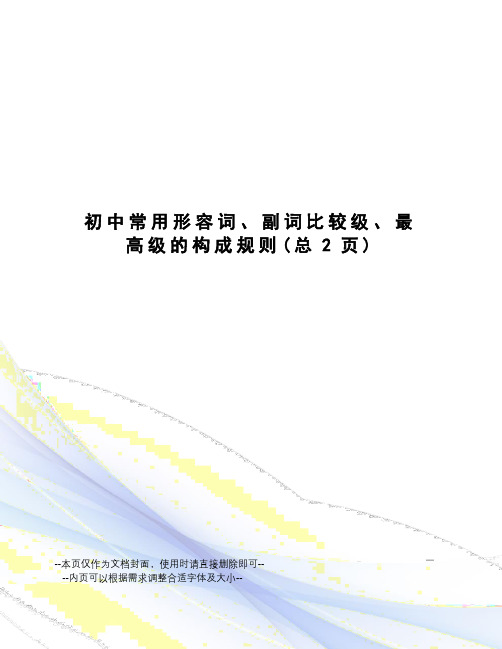
初中常用形容词、副词比较级、最高级的构成规则(总2页)--本页仅作为文档封面,使用时请直接删除即可----内页可以根据需求调整合适字体及大小--一、形容词、副词的比较级和最高级的构成规则1 、一般情况下,单音节或双音节的形容词(或副词)比较级+er ,最高级+estclever-cleverer-cleverest few-fewer-fewest small-smaller-smallestyoung-younger-youngest tall-taller-tallest long-longer longest short-shorter-shortest strong-stronger-strongest warm-warmer-warmest slow-slower-slowest old-older-oldest high-higher-highest light-lighter-lightest fast-faster-fastest great—greater—greatestcool-cooler-coolest clean-cleaner-cleanest cheap-cheaper-cheapestquick-quicker-quickest dear---dearer---dearest2、以不发音e结尾的单音节词,比较在原级后加-r,最高级在原级后加-st;nice-nicer-nicest late-later-latest able-abler-ablest brave-braver-bravestcute-cuter-cutest large-larger-largest close-closer-closest(亲密的)fine-finer-finest white-whiter-whitest free- freer-freest(免费的)3、以“辅音字母+y”结尾的双音节词,把y改为i,比较级加-er,最高级加-est;easy-easier-easiest happy-happier-happiest early-earlier-earliest busy-busier-busiest heavy-heavier-heaviest dirty-dirtier-dirtiestlazy-lazier-laziest dry-drier-driest pretty-prettier-prettiestfunny-funnier-funniest4、在重读闭音节(即:辅音+元音+辅音)中,先双写末尾的辅音字母,比较级加-er,最高级加-est;fat-fatter-fattest thin-thinner-thinnest hot-hotter-hottest fit-fitter-fittest(合适的)red-redder-reddest wet-wetter-wettest big-bigger-biggest sad-sadder-saddest5、其他双音节词和多音节词,比较级在前面加more,最高级在前面加most;beautiful -more beautiful -most beautiful careful-more careful-most carefulintelligent-more intelligent-most intelligent friendly-more friendly-most friendlyexpensive delicious(美味的) popular(流行的) important(重要的) interesting(有趣的) afraid(害怕)quickly(迅速地的) quietly (安静地) dangerous(危险的)6、少数单音节词也是这样;pleased-more pleased -most pleasedtired-more tired -most tired7、少数不规则形容词、副词的比较级和最高级,必须熟记。
- 1、下载文档前请自行甄别文档内容的完整性,平台不提供额外的编辑、内容补充、找答案等附加服务。
- 2、"仅部分预览"的文档,不可在线预览部分如存在完整性等问题,可反馈申请退款(可完整预览的文档不适用该条件!)。
- 3、如文档侵犯您的权益,请联系客服反馈,我们会尽快为您处理(人工客服工作时间:9:00-18:30)。
bright
slowly
cool
deeply
near
beautifully
free
interested
close
famous
nicive
white
tired
sore
delicious
true
open
large
difficult
handsome
dark
careless
3、单元音+1 个辅音双写词尾+er, red big hot thin fat sad slim flat mad
est
4、辅+y,,y—i+er(est)
easy happy healthy early busy ugly curly funny scary pretty angry cloudy sunny rainy windy
化
原级
比较级
最高级
词义
good/well
better
best
bad/ill
worse
worst
many/much
more
most
little
less
least
far
farther
farthest
距离
further
furthest
程度
late
later
latest
时间(迟到)
latter
last
顺序 (先来后到的关系)
old
older
oldest
年龄关系
elder
eldest
兄弟姐妹关系
形容词、副词的比较级和最高级的考试
原形 比较级 最高级 原形 比较级
hard
carefully
quick
beautifully
cold
active
nervous
wrong
unusual
right
usual
round
modest
smart
lovely friendly unfriendly unhappy unlucky furry tiny guilty greedy heavy moody lively thirsty
lazy hungry sorry empty crazy silly pushy lucky shy(2 种)
early
careful
busy
carefully
ugly
quickly
curly
quietly
funny
disappointed
scary
friendly
pretty
unfriendly
angry
unhappy
cloudy
unlucky
sunny
最高级
原形 比较级
stupid wild much little far late old successful unpleasant similar pleasant polite common good well bad ill many quiet deaf full poor real gray often clever narrow simple fine true cute red hot fat slim mad easy happy healthy amazing awful
不
多数
useful famous quickly beautiful creative serious outgoing amazing awful exciting excited interested famous
多音节词 expensive inexpensive tired (双元音)real (双元音) honest wonderful interesting fantastic truly(双音节
blind dumb deaf full poor real few gray often(2) stupid(2) polite(2 种) clever narrow simple
2、 e 结尾的+r, st
fine free close nice able white blonde sore true large safe handsome lame true sure cute(2 种)
则
right ( 单 音 节 词 ) casual casually nervous unusual usual modest natural pleased realistic popular loving
inexpensive comfortable convenient crowded careless careful carefully completely quickly quietly specifically
规
more,most 副词) sadly (双音节副词)slowly (双音节副词)deeply (双音节副词)beautifully delicious open
+原级
( opener 开 启 工 具) difficult carefully beautifully careless active athletic foolish wrong(单 音 节 词 )
natural
loud
realistic
short
popular
long
loving
calm
inexpensive
cheap
comfortable
strong
convenient
high
crowded
real
new
honest
sour
wonderful
warm
interesting
sick
sadly
形容词、副词的比较级和最高级
1、一 般单音节词和“er, ow, y, le” hard quick cold new sour round smart loud mean stupid wild dull quiet black warm sick bright
结尾的双音节词+ er, est。
cool near weak bald young straight tall short long calm deep cheap strong high slow dark great
变
disappointed successful suitable educational unpleasant similar pleasant common(2 种 ) gradually
disgusted aggressive particularly enormous intelligent original embarrassed convincing exhausted(斜体不考)
